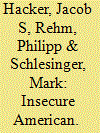| Srl | Item |
| 1 |
ID:
062275


|
|
|
| 2 |
ID:
121589


|
|
|
|
|
| Publication |
2013.
|
| Summary/Abstract |
Even before the sharp downturn that began in 2007, many Americans were concerned about economic risks. Yet this widespread public concern has not been matched by attention from political scientists regarding how citizens experience and understand the economic risks they face or how those experiences and understandings shape their views of public policy. We develop here an argument about the role of personal economic experiences in the formation of policy attitudes that we validate using a distinctive opinion survey of our own design, fielded not long after the onset of the Great Recession. The survey tracks citizens' economic experiences, expectations, and policy attitudes within multiple domains of risk (employment, medical care, family, and wealth arrangements). These investigations show that economic insecurity systematically and substantially affects citizens' attitudes toward government's role. Citizens' economic worries largely track exposure to substantial economic shocks. Citizens' policy attitudes in turn appear highly responsive to economic worries, as well as to the experience of economic shocks-with worries and shocks creating greater support for government policies that buffer the relevant economic risk. Attitudes seem most affected by temporally proximate shocks, shocks befalling households that have weak private safety nets, and shocks occurring within the domain most relevant to the policy in question, though attitudes are also (more weakly) correlated with shocks in other domains. The magnitude of these associations rivals partisanship and ideology and almost always exceeds that for conventional measures of socio-economic status. Given the long-term increase in economic insecurity and current sluggish recovery, understanding how insecurity shapes citizens' policy attitudes and political behavior should be a major concern of political science.
|
|
|
|
|
|
|
|
|
|
|
|
|
|
|
|
| 3 |
ID:
146765


|
|
|
|
|
| Summary/Abstract |
Since 1991, Russia has become one of the leading immigration destinations in the industrialised world. The inflow has prompted substantial public opposition, as surveys show that half or more of the public want to limit new arrivals. The sources of public disapproval, however, are unclear: while public discourse includes complaints about perceived economic and cultural ills of immigration, research on public opinion finds that neither economic nor cultural concerns have a consistent impact on individual attitudes. This study provides a new analysis, showing that economic vulnerability and cultural orientations (such as social conservatism and low levels of interpersonal trust) play a significant role in shaping anti-immigrant sentiment.
|
|
|
|
|
|
|
|
|
|
|
|
|
|
|
|